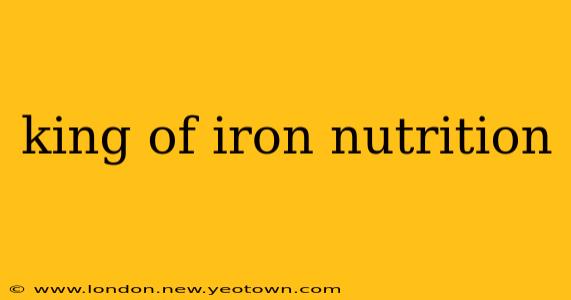Iron. The very word conjures images of strength, resilience, and perhaps even a bit of rust. But in the human body, iron is far from rusty; it's a vital mineral, the king of our red blood cell production, playing a crucial role in energy production and countless other bodily functions. Its absence, however, can lead to a kingdom in chaos, a realm of fatigue, weakness, and impaired cognitive function. This journey into the world of iron nutrition will illuminate its importance, guide you through understanding your needs, and empower you to maintain a healthy iron reign within your own body.
What is Iron and Why is it Important?
Iron is a trace mineral, meaning we only need small amounts, but those small amounts are absolutely essential. Imagine iron as the courier delivering oxygen throughout your body. It's a key component of hemoglobin, the protein in red blood cells that carries oxygen from your lungs to all your tissues and organs. Without sufficient iron, your cells become oxygen-starved, leading to fatigue and a host of other problems. Beyond oxygen transport, iron also plays a critical role in:
- Energy production: Iron is involved in the creation of ATP, the body's primary energy source.
- Immune function: Iron is essential for the proper functioning of your immune system, helping your body fight off infections.
- Brain development: Adequate iron levels are crucial for optimal brain development, particularly in children and pregnant women.
- DNA synthesis: Iron plays a role in the production of DNA, the blueprint of life.
What are the Best Sources of Dietary Iron?
The quest for sufficient iron begins with understanding where to find it. There are two main types of dietary iron: heme and non-heme. Heme iron, found exclusively in animal products, is more easily absorbed by the body than non-heme iron.
Heme Iron Sources:
- Red meat: Steak, beef, lamb, and organ meats (liver) are excellent sources.
- Poultry: Chicken and turkey, particularly dark meat.
- Seafood: Shellfish like clams and oysters are exceptionally rich in iron.
Non-Heme Iron Sources:
- Legumes: Lentils, beans, and chickpeas are good sources.
- Leafy green vegetables: Spinach, kale, and collard greens.
- Fortified foods: Many breakfast cereals and grains are fortified with iron.
- Dried fruits: Raisins and apricots.
How Much Iron Do I Need?
The recommended daily allowance (RDA) for iron varies depending on age, sex, and overall health. Pregnant women, for instance, have significantly higher iron needs due to the growth and development of the fetus. It's always best to consult a doctor or registered dietitian to determine your individual iron needs and whether supplementation is necessary. Relying solely on online resources can be misleading and potentially harmful. A personalized assessment will consider your unique circumstances and help you make informed choices.
What are the Symptoms of Iron Deficiency?
Iron deficiency isn't always immediately noticeable. Its subtle onset can make it challenging to identify initially. Common symptoms include:
- Fatigue and weakness: This is often the first sign, and it can significantly impact daily life.
- Pale skin: A reduction in hemoglobin can lead to noticeable paleness.
- Shortness of breath: This results from reduced oxygen-carrying capacity.
- Headaches: Iron deficiency can lead to various neurological symptoms including headaches.
- Cold hands and feet: Reduced blood flow due to reduced hemoglobin levels can lead to cold extremities.
- Brittle nails: Iron deficiency can impact nail health, making them brittle and prone to breakage.
Can I Get Too Much Iron?
While iron deficiency is a common concern, it's also possible to have too much iron. This condition, called hemochromatosis, is a genetic disorder that causes the body to absorb excessive amounts of iron. Excess iron can damage organs such as the liver, heart, and pancreas. If you suspect you might have hemochromatosis or are taking iron supplements, regular blood tests are crucial to monitor your iron levels.
How Can I Improve Iron Absorption?
The body doesn't absorb all the iron we consume; the absorption rate varies depending on several factors. You can improve iron absorption by:
- Pairing non-heme iron sources with Vitamin C: Vitamin C enhances the absorption of non-heme iron. Consider having a glass of orange juice with your iron-rich breakfast cereal.
- Avoiding substances that inhibit iron absorption: Substances like tannins (found in tea and coffee) and phytates (found in grains and legumes) can reduce iron absorption. Try not to consume these with iron-rich meals.
What are the risks of Iron Deficiency in Pregnancy?
Iron deficiency anemia during pregnancy can have severe consequences for both mother and child. It can lead to premature birth, low birth weight, and even infant mortality. Therefore, adequate iron intake during pregnancy is paramount. Pregnant women should consult their healthcare provider regarding iron supplementation and dietary strategies.
This journey into the realm of iron nutrition highlights the importance of this essential mineral. Remember, maintaining a healthy balance is key. Consult with healthcare professionals for personalized guidance and regular check-ups to ensure your iron kingdom thrives.

